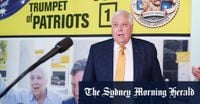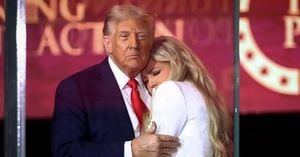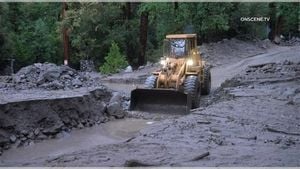As Australia heads into an election year, the political landscape is shifting, with the emergence of Clive Palmer’s Trumpet of Patriots party aiming to disrupt the traditional dominance of the major parties. Palmer's strategy includes placing incumbent parties last on how-to-vote cards, a move that could significantly impact the outcomes in several key electorates.
In a bold departure from past tactics, the Trumpet of Patriots is targeting Liberal MPs in regional Victorian seats, specifically Wannon and Monash, as well as the northern Sydney seat of Bradfield. This shift aims to bolster independent candidates backed by the Climate 200 group, potentially altering the balance of power in these tight races.
Clive Palmer, known for his controversial political maneuvers, stated, "They don’t really dislike each other; it’s a case of you scratch my back, I’ll scratch yours. That’s why we’ve had a uni-party for many years and that’s why we are going backwards." His remarks reflect a growing frustration with the established political order, which he believes has failed to represent the interests of ordinary Australians.
In the marginal seat of Bennelong, the Trumpet of Patriots will preference incumbent Labor MP Jerome Laxale over Liberal challenger Scott Yung. This seat, considered notionally Liberal by a mere 0.04 percent following a recent redistribution, could see Palmer's party play a crucial role. In the 2022 election, the Trumpet of Patriots received 2.93 percent of the votes in Bennelong, indicating that their preferences could sway the results significantly.
Polling data suggests that Palmer's party is struggling to gain traction, with a recent YouGov poll indicating support at just 2 percent. Meanwhile, a Resolve poll reported that 5 percent of voters are leaning towards “other” candidates, which includes independents and One Nation. Despite a hefty $100 million advertising budget, Palmer's rebranding from the United Australia Party to the Trumpet of Patriots has not yielded the expected results.
Kevin Bonham, a polling analyst, expressed skepticism about the impact of Palmer's how-to-vote cards, noting, "Not many people follow their how to vote cards, and they won’t get many votes anyway. Minor party voters tend to be independent-minded and may not even see the cards." Nevertheless, in closely contested seats like Wannon, where Liberal MP Dan Tehan is facing independent challenger Alex Dyson, the preference flows could be pivotal if Palmer's party performs similarly to their previous election results.
In Monash, Palmer's party is placing Climate 200 candidate Deb Leonard second on their how-to-vote card, followed by the incumbent Liberal defector Russell Broadbent, with the new Liberal candidate positioned last. Palmer secured 4.13 percent of the vote in Monash during the last election, and a strategic shift in preferences could disrupt the Liberal hold on the seat.
Bradfield presents another opportunity for Palmer to influence the election, having attracted 2.6 percent of the vote in 2022. Should the preference flow shift from the Liberals to independents, it could significantly affect the outcome for Liberal candidate Gisele Kapterian.
In a broader context, Palmer’s Trumpet of Patriots party aims to capitalize on the growing discontent among voters who feel neglected by the major parties. Recent polling indicates a shift away from the Coalition towards third-party options, with voters increasingly looking for alternatives to the traditional political landscape.
In addition to targeting incumbents, the Trumpet of Patriots is advocating for a range of policies aimed at addressing pressing national issues. These include cutting immigration to sustainable levels, establishing high-speed rail networks, and repealing the ban on nuclear energy. Palmer has also expressed intentions to exit international agreements like the Paris Agreement and to prioritize Australian industries over foreign dependency.
Palmer’s approach seems to resonate with a segment of the electorate that is frustrated with rising costs of living, crumbling infrastructure, and a perceived lack of representation. “We will place Labor and the Liberals last in the seats they hold to shake up the status quo and bring common-sense policies to fix this great country,” Palmer asserted, emphasizing his commitment to addressing the concerns of everyday Australians.
As the election approaches, the role of minor parties and independents is becoming increasingly critical. With the Trumpet of Patriots positioning itself as a viable alternative to the major parties, the potential for significant electoral upheaval looms large. Voters in key electorates will be closely watching how Palmer’s strategies unfold and what impact they will have on the future of Australian politics.
In conclusion, the upcoming election is shaping up to be a pivotal moment for both Clive Palmer and the Trumpet of Patriots. As they seek to disrupt the established order, the effectiveness of their strategies will be tested against the backdrop of changing voter sentiments and a growing appetite for alternatives in Australian politics.






